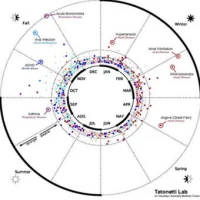According to a peer-reviewed commentary published online in the American Journal of Public Health, health awareness days have not been appropriately scrutinised given the scale at which they have been embraced.
Jonathan Purtle, DrPH, Assistant Professor at the Drexel University School of Public Health and Leah Roman, MPH, a public health consultant, investigated the prevalence of evaluation data for health awareness days. Their analysis demonstrated two trends: on one hand, health awareness days were seemingly ubiquitous and on the other hand, the guidance from public health leaders has been to develop and implement evidence-based interventions. Purtle and Roman's analysis reveals that awareness initiatives are not really grounded in evidence.
During their analysis, the two researchers used 74 English-language articles in the PubMed database of scientific and medical research that referenced "awareness days" either in the title or the abstract. They found that only five of these 74 articles were empirical studies that evaluated the impact of an awareness day. In addition, none of these articles evaluated any US based initiatives. The remaining articles were either editorials or commentaries that publicised an awareness day or they were studies investigating concepts other than the awareness day itself.
The findings and the review by Purtle and Roman does not advocate the end to awareness days nor are the researchers criticising the good intentions or efforts of those who initiate and take part in such awareness campaigns. The researchers simply want to stimulate a dialogue about such days and how the concept of awareness is currently used in public health. They feel that the concept is hard to measure and is defined quite vaguely. They have several recommendations that they feel could maximise the impact of the awareness days on public health.
The authors argue that most awareness day initiatives focus on changing health knowledge and behaviour at an individual level but they fail to recognise that social and environmental factors also have significant impact on the population health.
"Awareness days can potentially have very positive impacts, in my opinion, if they raise awareness around specific policy issues and advocate for policy change--not just individual change," Purtle said.
The authors recommend that public health practitioners that are involved in initiating awareness days should develop programs according to evidence-based principles of health promotion practices such as the guide "Making Health Communication Programs Work" by the National Cancer Institute.
"The development and implementation of these days can be incredibly resource intensive, so we should approach them with the same scrutiny with which we approach other types of public health interventions," Roman said. He emphasises that the goal should be to ensure the initiatives bring about meaningful change to public health.
Source: Drexel University
Image Credit: Pixabay
References:
Purtle, Jonathan. Roman, Leah A. (2015). Health Awareness Days: Sufficient Evidence to Support the Craze? American Journal of Public Health. e-View Ahead of Print.
doi: 10.2105/AJPH.2015.302621

![Tuberculosis Diagnostics: The Promise of [18F]FDT PET Imaging Tuberculosis Diagnostics: The Promise of [18F]FDT PET Imaging](https://res.cloudinary.com/healthmanagement-org/image/upload/c_thumb,f_auto,fl_lossy,h_184,q_90,w_500/v1721132076/cw/00127782_cw_image_wi_88cc5f34b1423cec414436d2748b40ce.webp)







